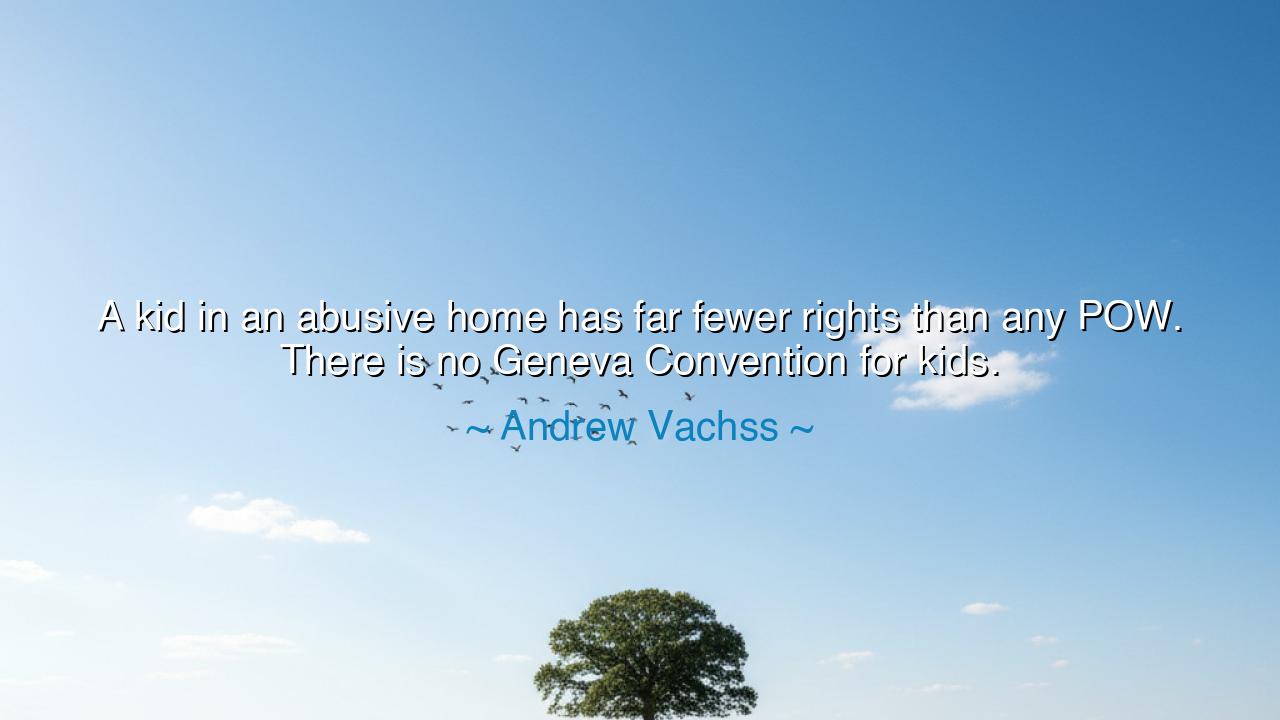
A kid in an abusive home has far fewer rights than any POW. There
A kid in an abusive home has far fewer rights than any POW. There is no Geneva Convention for kids.






When Andrew Vachss declared, “A kid in an abusive home has far fewer rights than any POW. There is no Geneva Convention for kids,” he was not merely offering an observation—he was delivering an indictment upon the conscience of humanity. His words rise from the darkness like a cry for justice, a torch held high in the hidden corridors where the voices of the innocent are silenced. Vachss, a man who devoted his life to protecting abused and neglected children, spoke these words as both witness and warrior. In them lies a truth so devastating, so unflinching, that it cannot be ignored: the world, though it writes laws for soldiers and captives, too often turns away from the battlefields of childhood, where the smallest and most vulnerable suffer in silence.
To compare a child in an abusive home with a prisoner of war is to pierce through the veil of social complacency. A prisoner of war, though captured and beaten, is at least protected by the world’s conscience—the Geneva Convention, a covenant of nations promising to uphold certain standards of humanity even amidst bloodshed. But the abused child, imprisoned not by an enemy but by those who should love them, has no such protection. Their walls are painted not with the marks of battle, but with the invisible bruises of betrayal. The home, which should be a sanctuary, becomes a dungeon, and the hands meant to comfort become instruments of torment. In this way, Vachss reveals the cruelest truth: that evil done in secret is often left unpunished, for it wears the mask of family and hides behind closed doors.
The origin of this quote lies in Vachss’s own life’s work. He was not merely a writer but a lawyer and advocate for abused children, a man who saw firsthand the failures of justice. His novels, filled with darkness and moral fury, were more than fiction—they were warnings to the world. He fought in courts and in literature alike, exposing the hypocrisy of societies that claim to protect the weak while abandoning them in practice. His words are the voice of every child who was told to stay silent, every heart that learned too early that no one was coming to save them. Through his message, Vachss reminds us that laws mean nothing unless they are wielded in defense of the defenseless.
The ancients, too, knew that the measure of a civilization lay not in its temples or its armies, but in how it treated its children. In the days of old, Sparta raised warriors, but Athens raised citizens—and both believed that the young were the seed of the nation’s soul. Yet even in their glory, cruelty toward the helpless was not unknown. The philosopher Plato once wrote that injustice within the home poisons the state, for what begins in the family spreads into the world. Vachss’s words carry this same timeless warning: a society that allows its children to be broken in secret will, in time, become broken itself. For where compassion is absent, decay begins.
There is a power in his comparison that demands reflection. A POW has the world’s sympathy; journalists, advocates, and nations rally for their freedom. But the abused child often has no voice, no witness, no army. Their captor is not a foreign power, but a parent or guardian whose authority shields their cruelty. This is why Vachss’s metaphor is so devastating—because it exposes the world’s selective morality. We build treaties for soldiers, but none for sons and daughters. We cry for peace among nations, but ignore the wars waged in our own homes. And in doing so, we betray not only the children, but the very ideals we claim to defend.
Yet, even amidst this darkness, there is hope, for Vachss’s words are not meant to paralyze—they are meant to awaken. He calls us to action, to see what we have refused to see. The Geneva Convention for children does not yet exist in ink, but it can exist in our hearts, our laws, and our daily choices. Every teacher who listens, every neighbor who speaks up, every lawmaker who strengthens protection for the vulnerable—these are the builders of that invisible covenant. The world changes not through silence, but through courage, and every act of awareness becomes a sword against cruelty.
So, let Andrew Vachss’s words be remembered not as despair, but as commandment. Protect the child. Defend the voiceless. Stand guard at the threshold of innocence, for the battles fought there shape the future of humankind. The Geneva Convention may not yet cover the homes of the broken, but each of us can become its living embodiment. Let compassion be our law, vigilance our duty, and justice our creed. For until every child is safe, no nation can call itself truly civilized—and no heart can claim to know peace.






AAdministratorAdministrator
Welcome, honored guests. Please leave a comment, we will respond soon